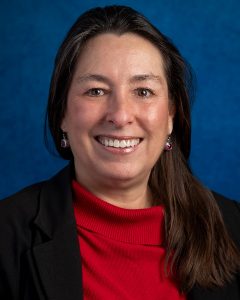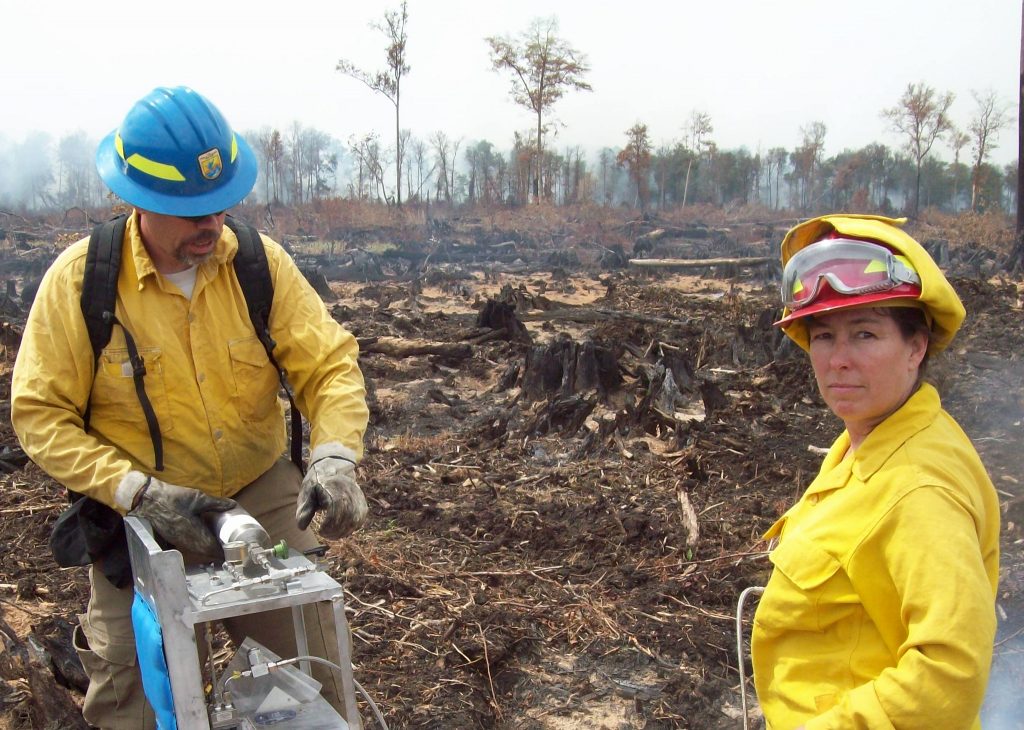FOR IMMEDIATE RELEASE
NIA Release 2022-01
Jan. 13, 2022
Soja Promoted to NIA Research Fellow
Hampton, Va. — The National Institute of Aerospace (NIA) has named Dr. Amber Soja as a Research Fellow. Individuals earn the distinction of recognition as an NIA Research Fellow based upon their demonstrated technical achievements, and their leadership within the international technical communities to which their research work contributes. She is the sixth researcher and first female promoted to this position in the institute’s history.

Soja joined NIA in 2005 as a research scientist. As a resident in the Climate Science and Atmospheric Composition branches of the Science Directorate at NASA’s Langley Research Center, her research focuses on using satellite, Geographic Information System (GIS), field-based, and modeled data as tools to explore the dynamic relationships between fire regimes, fire weather, air quality, the biosphere, atmosphere, and climate systems.
“Understanding wildfire smoke and biomass burning emissions and associated impacts on air quality, weather, and our changing climate are among the most pressing concerns of our human and environmental health,” says Doug Stanley, president and executive director of NIA. “For over 25 years, Dr. Soja’s work has been—and continues to be—vital to advancing the science in this domain.” “We are honored to count her among our research staff.”
National and global media organizations such as the Washington Post, National Geographic, National Public Radio (NPR), and Nature frequently call on Soja as an eminent expert in wildland fire and related feedbacks with climate systems.
Soja currently co-leads a multi-agency team within NASA’s Health and Air Quality Applied Sciences Team (HAQAST) that seeks to quantify smoke from small-fire burning in the U.S. with study sites in Florida and Kansas. The study will serve as a best practice for conducting exposure assessments using a fusion approach for other small-fire burning practices across the world. Recently, Soja served as a member of the Applications Impact Team (AIT) on the Aerosol, Clouds, Climate and Precipitation (A-CCP) study team to define a satellite mission to be launched late in the 2020s to advance cloud and aerosol science.
Other interdisciplinary, national and international field campaigns she has participated in include FireBear, INTEX-A, INTEX-B, TexAQS and ARCTAS. In these campaigns, Soja investigated fire behavior and emissions, the interaction between fire, weather and climate, and modeled the potential fire-induced change in vegetation under current and projected climate change scenarios, primarily in remote Siberia. Soja also served as a key member of the FIREX-AQ mission, using in-situ- (ground, mobile, and aircraft), satellite, and modeled data to investigate the chemical and dynamic transport of fire emissions and how these relate to air quality and climate. She is also known for contributions in advancing the use of Cloud-Aerosol Lidar and Infrared Pathfinder Satellite Observations (CALIPSO) data to understand fire plume injection height. Past roles at NASA also include roles as an associate program manager for NASA’s Applied Sciences Wildland Fire program and a disasters coordinator for NASA Langley.
Dr. Soja serves on the International Association of Wildland Fire (IAWF) Board of Directors and as a co-chair for the IAWF Diversity and Inclusivity Committee. She holds a B.A. (1996) and a Ph.D. (2004) in Environmental Sciences from the University of Virginia and received the National Academies National Research Council Post-doctoral Award, for “The Effect of Burned Area on Land Cover and Albedo in Siberia 2004-2005.”
About the National Institute of Aerospace:
The National Institute of Aerospace (NIA) is an independent non-profit research, graduate education, and outreach institute located in Hampton, Virginia. NIA is a national leader in aerospace and aviation research and collaborates with NASA, the FAA, and other government agencies and laboratories, universities, and industry to conduct research and technology development in space exploration, aeronautics and science.
For more information about the National Institute of Aerospace, visit: www.NIAnet.org.
Contact:
Carly Bosco
Director, Research Programs
National Institute of Aerospace
(757) 325-6726
carly.bosco@nianet.org

